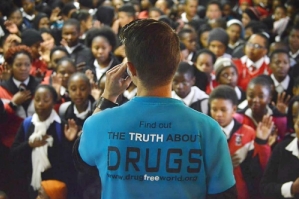Drug-Free World Africa coordinator Maurithus Meiring was named runner-up at the South African Men of the Year Awards Banquet at Emperors Palace in Johannesburg for his relentless campaign to reach African youth before drug pushers do. Meiring, who is also director of public affairs for the Church of Scientology of Pretoria, said the difference between the Drug-Free World campaign and other programs is "it does not moralize or preach - it simply presents the cold, hard facts."
Over the past two years, Meiring and volunteers distributed 500,000 Drug-Free World booklets, delivered 700-plus lectures and events and built a network of 34 drug education teams in South Africa. They also reach more than 100,000 people with their drug prevention message through social media each month.
"Much more work needs to be done to reach more people, and to reach African youth faster," he said.
Since beginning the drug prevention campaign, Drug-Free World Africa cites a 7 to 9 percent drop in drug-related statistics in the South African provinces of Gauteng, Western Cape, Kwa-Zulu Natal, Eastern Cape and Mpumalanga. In Gauteng, where Drug-Free World Africa conducted 50 drug education lectures, training sessions, and community events over the past year, there was a 10 percent decrease in drug-related crime and DUI arrests.
"Education is the most effective tool against drugs and substance abuse," says Meiring.

It was Meiring's own experience with drugs and drug education that inspired him to take on this issue. Raised in an Afrikaans middle class family, he said he turned to alcohol as well as drugs, including Ecstasy and cocaine, when his parents divorced. His 15-year battle with alcohol ended the day a friend introduced him to the Drug-Free World campaign with a copy of "The Truth About Drugs" booklet that spelled out the long-term effects of drug and alcohol abuse.
"I quit from one day to the next," he said.
Meiring describes their current Drug-Free work with Bisho High School in South Africa's Eastern Cape Province where 42 percent of the students were on illicit drugs when they began their campaign-drugs such as heroin, the deadly new cocktail known as "nyaope," and crystal methamphetamine (known locally as "tik"). "Within a year, the drug use in the school had fallen to 5 percent-and by the second year it was completely drug-free," Meiring said.
The South African Men of the Year Awards was established to celebrate South African men as part of a drive to create "an environment that is conducive to the development, recognition, talent and inspiration of modern South African men making a difference in their communities," giving them greater opportunity "to continue their good work while challenging others to follow suit."







